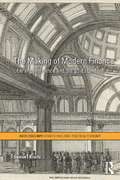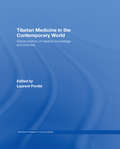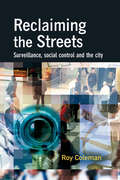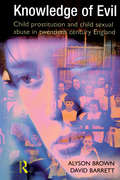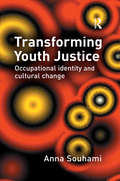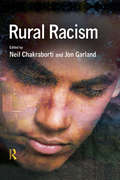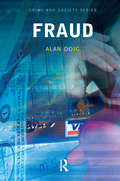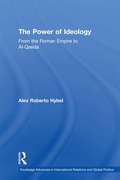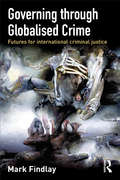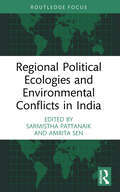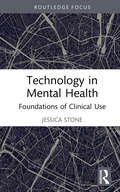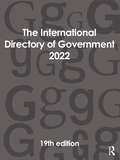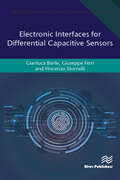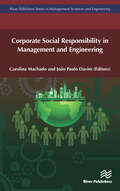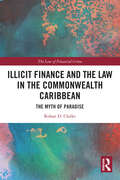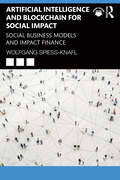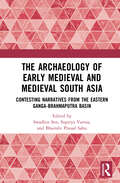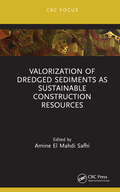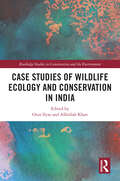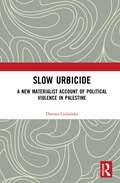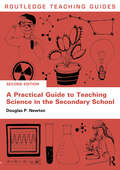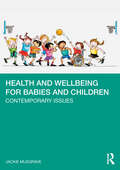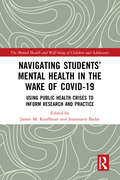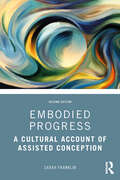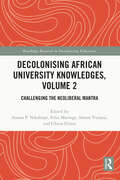Special Collections
Benetech’s Global Certified Accessible Titles
Description: Benetech’s GCA program is the first independent third-party EPUB certification to verify ebook accessibility. By creating content that is born accessible, publishers can meet the needs of all readers. Learn more: https://bornaccessible.benetech.org/
- Table View
- List View
The Making of Modern Finance
by Samuel KnafoThe Making of Modern Finance is a path-breaking study of the construction of liberal financial governance and demonstrates how complex forms of control by the state profoundly transformed the nature of modern finance. Challenging dominant theoretical conceptions of liberal financial governance in international political economy, this book argues that liberal economic governance is too often perceived as a passive form of governance. It situates the gold standard in relation to practices of monetary governance which preceded it, tracing the evolution of monetary governance from the late middle Ages to show how the 19th century gold standard transformed the way states relate to finance. More specifically, Knafo demonstrates that the institutions of the gold standard helped to put in place instruments of modern monetary policy that are usually associated with central banking and argues that the gold standard was a prelude to Keynesian policies rather than its antithesis. The author reveals that these state interventions played a vital role in the rise of modern financial techniques which emerged in the late 18th and 19th century and served as the foundation for contemporary financial systems. This book will be of strong interest to students and scholars of international political economy, economic history and historical sociology. It will appeal to those interested in monetary and financial history, the modern state, liberal governance, and varieties of capitalism.
Tibetan Medicine in the Contemporary World
by Laurent PordiéThe popularity of Tibetan medicine plays a central role in the international market for alternative medicine and has been increasing and extending far beyond its original cultural area becoming a global phenomenon. This book analyses Tibetan medicine in the 21st century by considering the contemporary reasons that have led to its diversity and by bringing out the common orientations of this medical system. Using case studies that examine of the social, political and identity dynamics of Tibetan medicine in Nepal, India, the PRC, Mongolia, the UK and the US, the contributors to this book answer the following three, fundamental questions: What are the modalities and issues involved in the social and therapeutic transformations of Tibetan medicine? How are national policies and health reforms connected to the processes of contemporary redefinition of this medicine? How does Tibetan medicine fit into the present, globalized context of the medical world? Written by experts in the field from the US, France, Canada, China and the UK this book will be invaluable to students and scholars interested in contemporary medicine, Tibetan studies, health studies and the anthropology of Asia. 'Winner of the ICAS Colleagues Choice Award 2009"
Reclaiming the Streets
by Roy ColemanIn an age of mass camera surveillance people in the UK have become the most watched, catalogued and categorised people in the western world, all with little public debate or opposition. Nor has there been much more critical research that understands CCTV within the broader social relations out of which it has grown and consolidated. The aim of this book is to analyse the use of CCTV within this broader social, political and ideological context, focusing on relations between surveillance, power and social order, using Liverpool as a case study. At the same time the book provides a study of social control in Liverpool city centre, exploring the development of, and meaning attributed to, social control practices by those at the centre of the implementation and management of these practices. As such the book is a study of the 'locally powerful', their organisation through the local state, and their perceptions of order and disorder in the city centre. Liverpool's CCTV network is thus seen as emblematic of the developments in social control which the book explores. The book makes a key contribution to theoretical debates around social control in four respects: it places the analysis of CCTV within an understanding of the social relations in which the technology emerged; it analyses CCTV as a normative tool of social control and not merely as a piece of crime prevention technology; it considers how social scientists and criminologists think about and understand social control in the contemporary setting; and finally it seeks to draw lessons from the Liverpool case study and considers their applicability to the study of CCTV more generally.
Knowledge of Evil
by David Barrett and Alyson BrownThis book aims to document and analyse the enduring involvement of children in the commercial sex trade in twentieth-century England. It uncovers new evidence to indicate the extent of under-age prostitution over this period, a much-neglected subject despite the increased visibility of children more generally. The authors argue that child prostitution needs to be understood within a broader context of child abuse, and that this provides one of the clearest manifestations of the way in which 'deviant groups' can be conceived of as both victims and threats. The picture of child prostitution which emerges is one of exclusion from mainstream society and the law, and remoteness from the agencies set up to help young people in trouble, which were often reluctant to accept the realities of child prostitution. The evidence provided in this book indicates that the circumstances which have led young people into prostitution over the last hundred years amount, at worst, to physical or psychological abuse or neglect, and at best as the result of limited choice.
Transforming Youth Justice
by Anna SouhamiIn 1997 the newly modernized Labour party swept into power promising a radical overhaul of the youth justice system. The creation of inter-agency Youth Offending Teams (YOTs) for the delivery of youth justice services were the cornerstone of the new approach. These new YOTs were designed to tackle an 'excuse culture' that was allegedto pervade the youth justice system and aimed to encourage the emergence of a shared culture among youth justice practitioners from different agencies. The transformation of the youth justice system brought about a period of intense disruption for the practitioners working within it. The nature and purpose of contemporary youth justice work was called into question and wider issues of occupational identity and culture became of crucial importance. Through a detailed ethnographic study of the formation of a YOT this book explores a previously neglected area of organisational cultures in criminal justice. It examines the nature of occupational culture and professional identity through the lived experience of youth justice professionals in this time of transition and change.It shows how profound and complex of the effects of organisational change are, and the fundamental challenges it raises for practitioners' sense of professional identity and vocation. Transforming Youth Justice makes a highly significant contribution not only to the way that professional cultures are understood in criminal justice, but to an understanding of the often dissonant relationship between policy and practice.
Rural Racism
by Jon Garland and Neil ChakrabortiRural issues are currently attracting unprecedented levels of interest, with the debates surrounding the future of 'traditional' rural customs and practice becoming a significant political concern. However, the problem of racism in rural areas has been largely overlooked by academics, practitioners and researchers who have sought almost exclusively to develop an understanding of racism in urban contexts. This book aims to address this oversight by examining notions of ethnic identity, 'otherness' and racist victimisation that have tended to be marginalised from traditional rural discourse.
Fraud
by Alan DoigFraud remains one of the most important crimes and causes billions of pounds of losses each year, many thousands of people are employed to try to prevent it, but it has remained largely neglected in the literature. This book provides comprehensive coverage of the main issues involved in fraud, its definition, costs, the nature of the offenders involved in committing fraud, and the issues involved in fraud investigation. It is written by one of the foremost authorities on the subject, and covers fraud in the widest sense, ranging from benefit fraud to tax evasion, credit card fraud, and paying particular attention to fraud using the internet. A wide range of case studies are presented, portraits are provided of the ways in which a large number of organizations seek to deal with fraud. This book will be essential reading for anybody with a professional interest in fraud and its prevention, as well as the wide number of courses within law, criminology, social policy and business and management.
The Power of Ideology
by Alex Roberto HybelSince the Roman Empire, leaders have used ideology to organize the masses and instil amongst them a common consciousness, and equally to conquer, assimilate, or repel alternative ideologies. Ideology has been used to help create, safeguard, expand, or tear down political communities, states, empires, and regional or world systems. This book explores the multiple effects that competing ideologies have had on the world system for the past 1,700 years: the author examines the nature and content of Christianity, Islam, Confucianism, Protestantism, secularism, balance-of-power doctrine, nationalism, imperialism, anti-imperialist nationalism, liberalism, communism, fascism, Nazism, ethno-nationalism, and transnational radical Islamism; alongside the effects their originators sought to craft and the consequences they generated. This book argues that for centuries world actors have aspired to propagate through the world arena a structure of meaning that reflected their own system of beliefs, values and ideas: this would effectively promote and protect their material interests, and - believing their system to be superior to all others – they felt morally obliged to spread it. Radical transnational Islamism, Hybel argues, is driven by the same set of goals. This book will be of interest to students and scholars of international politics, international relations theory, history and political philosophy.
Governing Through Globalised Crime
by Mark J. FindlayGoverning through Globalised Crime provides an analysis of the impact of globalisation of crime on the governance capacity of the international criminal justice system. It explores how the perceived increased risk in global security has resulted in a reformulation of the relationship between crime and governance.The book seeks to argue that values of freedom, equality, communitarian harmony and personal integrity which the prosecution of crimes against humanity are said to advance, need not be sacrificed in a new world order obsessed with partial security and secularized risk. This book aims to address a way forward for the governance capacity of international criminal justice, arguing that international criminal justice provides a central tool for global governance. In exploring the dependency of global governance on crime and control, projections can be made about the changing face of international criminal justice. Fundamental transformation is required to hold unjust global dominion to account.The book's policy perspective challenges international criminal justice to return to the more critical position justice has exercised in the separation of powers constitutional legality. For liberal democratic theory at least, judicial authority and its institutions have ensured constitutional legality by requiring the legislature and the executive to operate accountably against a higher normative order. This is not a predominant function of judges and courts in the international context despite their statutory invocation to this task .Case-studies of global crime and control reveal contexts in which the co-opted governance of institutional ICJ in particular, has a politicized motivation which too often advances the authority and interests of one world order against the sometimes legitimate resistance of criminalized communities. When the analysis moves to the consideration of victim community interests, and from there to the appropriate global constituencies of ICJ, the nature and limitations of ICJ supporting governance in the risk/security model, becomes apparent.
Regional Political Ecologies and Environmental Conflicts in India
by Sarmistha Pattanaik and Amrita SenThis book focuses on the regional political ecologies (RPEs) of environmental conflicts in India. It explores broadly, landscape-based analyses of political, economic and social issues, which impact environmental changes, challenges and conflicts at local and micro-local levels. The chapters in this volume examine the intervention of different stakeholders in the management of various regional ecological landscapes in India, including forests, rivers, canals, creeks and wetlands. The volume is an interdisciplinary endeavour, weaving together contextual narratives through a combination of approaches from sociology, anthropology, geography, political studies and environmental history. Using such core approaches, the book studies the place-based dynamisms within the regional environmental conflicts in the selected conservation landscapes. It provides empirical reflections on transboundary issues, rural-urban transitions, middle-class environmentalism, identity conflicts, decentralized natural resource management and the role of political institutions. Regional Political Ecologies and Environmental Conflicts in India will be of great interest to students and scholars of Political Ecology and South Asian Environmental Studies.
Technology in Mental Health
by Jessica StoneTechnology in Mental Health focuses on the responsible integration of technology into therapy in a world affected by COVID. Author Jessica Stone discusses the pandemic’s effects on the mental health field, historical fundamentals, and possible future implications. Chapters also explore legal and ethical considerations as well as educational and supervision needs. Seasoned and new clinicians alike will find valuable information in these pages as they progress from traditional to modern to post-COVID mental health treatment.
The International Directory of Government 2022
by Europa Europa PublicationsThe International Directory of Government is the definitive guide to people in power in every part of the world. All the top decision-makers are included in this one-volume publication, which brings together government institutions, agencies and personnel from the largest nations (China, India, Russia, etc.) to the smallest overseas dependencies (Guadeloupe, Guernsey and Christmas Island, etc). Institutional entries contain the names and titles of principal officials, postal, e-mail and internet addresses, telephone and fax numbers where applicable, and other relevant details. Key features: - comprehensive lists of government ministers and ministries - coverage of state-related agencies and other institutions arranged by subject heading - details of important state, provincial and regional administrations, including information on US states, Russian republics, and the states and territories of India. Contents include: A comprehensive directory section organized by country or territory; Details of co-ordinating bodies, and of foundations, trusts and non-profit organizations; A full index of organizations, and indexes by main activity and by geographical area of activity.
Electronic Interfaces for Differential Capacitive Sensors
by Giuseppe Ferri and Vincenzo Stornelli and Gianluca BarileIn a world where great efforts are spent designing and creating more complex, yet efficient systems, sensing elements and related readout circuits, which constitute an integral part of them, need to be designed fulfilling these constraints, beside the common key parameters, such as high sensitivity, resolution and accuracy. Capacitive sensors and their differential subset provide virtually no energy dissipation, show insensitivity to temperature variations and have the capability to be micromachined directly onto a silicon substrate, together with the readout interface. Designing a readout circuit that takes advantage of these benefits, according to any specific application, is thus of utmost importance. This volume introduces the reader to state-of-the-art techniques and research achievements in interfacing differential capacitance sensors.Technical topics discussed in the book include:▪ Switched capacitor based interfaces;▪ Voltage mode, differential capacitance to time, voltage, digital converters;▪ Current mode interfaces based on standard components;▪ Current mode interfaces based on CCIIs and VCIIs;▪ Principles of second generation current and voltage conveyors.This book gives the reader a comprehensive overview on the working principles, equivalent circuit models and most advanced interfacing techniques for differential capacitive transducers, highlighting benefits and downsides of each option. Electronic interfaces for differential capacitive sensors is an ideal text for academic staff and Masters/research students in electronic and microelectronic engineering.
Corporate Social Responsibility in Management and Engineering
by Carolina Machado; João Paulo DavimReferring to an organizations responsibility for their impact on society, corporate social responsibility (CSR) is greatly relevant for the competitiveness, sustainability and innovation in the management and engineering arena of organizations, and the economy worldwide. Taking in account its these concerns, Corporate Social Responsibility in Management and Engineering covers the issues related to corporate social responsibility in management and engineering in a context where organizations are facing, day after day, high challenges for what concerns issues related to their social responsibility. The book looks to contribute to the exchange of experiences and perspectives about the state of the research related to CSR, as well as the future direction of this field of research. It looks to provide a support to academics and researchers, as well as those that operating in the management field need to deal with policies and strategies related to CSR.
Illicit Finance and the Law in the Commonwealth Caribbean
by Rohan D. ClarkeThis book provokes fresh ways of thinking about small developing States within the transnational legal order for combating money laundering and the financing of terrorism and proliferation (TAMLO). From the global wars on drugs and terror to journalistic exposés such as the ‘Paradise’, ‘Panama’ and ‘Pandora’ Papers, the Commonwealth Caribbean has been discursively stigmatised as a mythical island paradise of ‘rogue’ States. Not infrequently, their exercise of regulatory self-determination has been presented as the selling of their economic sovereignty to facilitate shady business deals and illicit finance from high-net-worth individuals, kleptocrats, tax-dodgers, organised crime networks and terrorist financiers. This book challenges conventional wisdom that Commonwealth Caribbean States are among the ‘weakest links’ within the global ecosystem to counter illicit finance. It achieves this by unmasking latent interests, and problematising coercive extraterritorial regulatory and surveillance practices, along the onshore/offshore and Global North/South axes. Interdisciplinary in its outlook, the book will appeal to policymakers, regulatory and supervisory authorities, academics and students concerned with better understanding legal and development policy issues related to risk-based regulatory governance of illicit finance as well as those arising from money laundering related to corruption, politically exposed persons (PEPs), offshore finance and offshore Internet gambling services.
Artificial Intelligence and Blockchain for Social Impact
by Wolfgang Spiess-KnaflArtificial Intelligence and Blockchain for Social Impact provides an accessible overview of artificial intelligence (AI) and blockchain technologies, and explores their applications for social enterprise and impact investing. The opening chapter introduces the impact space, exploring different social business models, the role of technology, the impact investing market and general problems in the space. The remainder of this book falls into two paths: the first focusing on AI and the other looking at the blockchain technology. Providing introductions to each of these technologies and their histories, the author goes on to examine them from the perspectives of social business models and impact finance. A concluding chapter explores AI and cryptocurrencies in the impact space in the future. Readers are supported with international case studies and other student-friendly features. Situated at the intersection between technology, fintech, social enterprise, impact investing and social impact, this book is a valuable resource for upper-level courses across all these areas. It also offers an introduction to this emerging topic for researchers and business professionals. Online teaching resources to accompany this book include instructor lecture slides and data sets.
The Archaeology of Early Medieval and Medieval South Asia
by Swadhin Sen, Supriya Varma, and Bhairabi Prasad SahuThis book looks at the ways in which archaeological methods have been used in debates concerning the early medieval and medieval periods in South Asia. Despite the incorporation and use of archaeological data to corroborate historical narratives, the theories and methods of archaeology are largely ignored in and excluded from the dominating, institutionalized and hegemonic disciplinary discourses. The volume offers contesting insights, polemical narratives, and new data from archaeological contexts to initiate a debate on many foundational premises of archaeological and historical narratives. It focuses on the much-neglected region of the Eastern Ganga-Brahmaputra Basin as a spatial frame to do this, and studies themes such as spatial and temporal scales of concepts and methods, multi-scaler factors and processes of continuity and changes, the settlement archaeology on alluvial landscape, changing patterns of agrarian transformation, and material cultures, including coins, inscriptions, pottery, sculptures, in their contexts in sub-regional, regional and supra-regional intersections. As a crucial and unprecedented intervention in the study of the early medieval and the medieval periods, this volume will be useful for scholars and researchers of archaeology, ancient history, medieval history, water history, earth sciences, palaeoecology, historical ecology, epigraphy, art history, material culture studies, Indian history, and South Asian Studies in general.
Valorization of Dredged Sediments as Sustainable Construction Resources
by Amine El Mahdi SafhiValorization of Dredged Sediments as Sustainable Construction Resources provides a comprehensive and up-to-date overview of research on the reuse of sediments as a raw material for civil engineering fields. Dredging is increasing in scale worldwide, while deep sea disposal is being eliminated and landfill disposal is becoming less sustainable. Yet these sediments offer a potentially useful resource for constructing pavements, soil, bricks, ceramic and clinker, for they provide fine and lightweight aggregates, supplementary cementitious materials and geopolymer binders. This has sparked considerable research on valorization, which is presented here. Covers the main re-uses of sediments and the valorization required Focuses on state-of-the-art research on practical guidance Discusses limitations and future perspectives for sediments valorization The book suits researchers and students working in the area, as well as industrial engineers and professionals working on recycling and dredging.
Case Studies of Wildlife Ecology and Conservation in India
by Orus Ilyas and Afifullah KhanThis volume brings together a collection of case studies examining wildlife ecology and conservation across India. The book explores and examines a wide range of fauna across different terrains and habitats in India, revealing key issues and concerns for biodiversity conservation, with a particular emphasis on the impact of humans and climate change. Cases are as wide ranging as tigers, leopards, sloth bears, pheasants, insects and birds, across a diverse range of landscapes, including forests, wetlands, nature reserves and even a university campus. Split into three parts, Part I focuses on how the distribution of animals is influenced by the availability of resources such as food, water, and space. Chapters examine key determinants, such as diet and prey and habitat preferences, with habitat loss also being an important factor. In Part II, chapters examine human-wildlife interactions, dealing with issues such as the impact of urbanization, the establishment of nature reserves and competition for resources. The book concludes with an examination of landscape ecology and conservation, with chapters in Part III focusing on habitat degradation, changes in land-use patterns and ecosystem management. Overall, the volume not only reflects the great breadth and depth of biodiversity in India, but offers important insights to the challenges facing biodiversity conservation not only in this region, but worldwide. This volume will be of great interest to students and scholars of wildlife ecology, conservation biology, biodiversity conservation and the environmental sciences more broadly.
Slow Urbicide
by Dorota GolańskaThe book presents a new materialist understanding of acts of deliberate destruction of the built environment and, specifically, of the politics of aggressive spatial containment and regularization of urbanity employed within the conflict in Israel/Palestine. Building on recent scholarship on slow violence and urbicidal policies, it discusses the different dimensions of the violence against the urban space, as well as exposes the complex material-semiotic character of the urban territory and of its destruction. By referring to the concepts of “ethno-territoriality” and “the right to the city,” the book aims to generate an enhanced understanding of problems situated at the overlap of urban studies and investigations of state-sponsored violence, focusing specifically on issues related to urban warfare. Adopting a new materialist perspective, the book is a searing examination of political violence in our times. The volume will be of great interest to scholars and researchers of political science, international relations, cultural studies, and urban studies. It will also appeal to NGO professionals and activists across the world.
A Practical Guide to Teaching Science in the Secondary School
by Douglas P. NewtonA Practical Guide to Teaching Science in the Secondary School is designed to support student teachers as they develop their teaching skills and increase their broader knowledge and understanding for teaching science. It offers straightforward advice and inspiration on key topics such as planning, assessment, practical work, the science classroom, and on to the broader aspects of teaching science. This thoroughly updated second edition reflects on new expectations, requirements, and practices in science teaching, with chapters exploring key and contemporary topics such as: The nature of science and scientific argument The various kinds of thinking emphasised in science and how to exercise them How to engage students in learning Assessment for and of learning Diverse needs and how to meet them The use of technology to support teaching and learning Learning at a distance. Designed to be used independently or alongside the popular textbook Learning to Teach Science in the Secondary School, this book is packed with revised and updated case studies, examples of pupils' work, and resources and activities in every chapter. It provides everything trainee and early career teachers need to reflect on and develop their teaching practice, helping them to plan lessons across the subject in a variety of teaching situations.
Health and Wellbeing for Babies and Children
by Jackie MusgraveThis evidence-based text explores children’s health and wellbeing from birth to adolescence, taking into account the familial, cultural, social, economic, environmental and global contexts of their lives. Divided into three parts, this book draws on an international body of research and theoretical perspectives on the determinants of health, such as hereditary, socioeconomic, environmental, geopolitical, gender and cross-cultural factors. It begins with an overview of child health and wellbeing before exploring global influences on health. The second part of the book focuses on health promotion and safeguarding. The final part looks at a range of health conditions that may impact children’s health, including infectious diseases, chronic health conditions and mental health. The book ends with a discussion of the role and contribution of families, carers, health professionals, hospitals, the wider community, charities and government, and examines how children with health needs and their families can best be supported. Each chapter includes critical questions, case studies and reflection points, all followed by a commentary to help the reader to think through the issues. Designed for all those working with children, or studying to work with children, Health and Wellbeing for Babies and Children: Contemporary Issues is ideal for students undertaking courses on public health nursing, children’s nursing, early years education, childhood studies and social work, among others.
Navigating Students’ Mental Health in the Wake of COVID-19
by James M. Kauffman and Jeanmarie BadarThis book highlights the effects of the COVID-19 pandemic on the mental health needs of children and adolescents in order to shed light on future practice and reform needed to better deal with the aftermath of such devastating events. The book identifies the conditions during any public health crisis that heighten the mental health needs of children and adolescents and suggests the reforms of mental health services needed to better meet the needs of children and youths during and following pandemics and other public health crises. Importance is placed not only on addressing the effects of COVID-19 but on anticipating and preparing for other public health disruptions to the lives of those who have not reached adulthood. Although mental health services in all settings are considered, special attention is given to the role of schools in providing for the mental health of children and adolescents and preparing for the mental health implications of future public health disruptions. The book will be of equal use to both students and researchers in the fields of mental health, well-being, and education as well as teachers, educational psychologists, social workers, and practitioners working in schools and communities to address students’ mental health needs. It will help readers better understand how and why COVID-19 was a negative influence on students’ mental health, and unpack how best to deal with the aftermath of the pandemic.
Embodied Progress
by Sarah FranklinThis new edition of Sarah Franklin’s classic monograph on the development of in vitro fertilisation (IVF) includes two entirely new chapters reflecting on the relevance of the book’s findings in the context of the past two decades and providing a ‘state-of-the-art’ review of the field today. Over the past 25 years, both the assisted conception industry and the academic field of reproductive studies have grown enormously. IVF, in particular, is belatedly becoming recognised as one of the most influential technologies of the twentieth and twenty-first centuries, with a far-reaching set of implications that have to date been underestimated, understudied and under-reported. This pioneering text was the first to explore the emergence of commercial IVF in the United Kingdom, where the technique was originally developed. During the 1980s, the British Parliament devised a unique system of comprehensive national regulation of assisted reproduction amidst fractious public and media debate over IVF and embryo research. Franklin chronicles these developments and explores their significance in relation to classic anthropological debates about the meanings of kinship, gender and the 'biological facts' of parenthood. Drawing on extensive personal interviews with women and couples undergoing IVF, as well as ethnographic fieldword in early IVF clinics, the book explores the unique demands of the IVF technique. In richly detailed chapters, it documents the ‘topsy-turvy’ world of IVF, and how the experience of undergoing IVF changes its users in ways they had not anticipated. Franklin argues that such experiences reveal a crucial feature of translational biomedical procedures more widely – namely, that these are ‘hope technologies’ that paradoxically generate new uncertainties and risks in the very space of their supposed resolution. The final chapter closely engages with the ‘hope technology’ concept, as well as the idea of ‘having to try’ and uses these frames to link contemporary reproductive studies to core sociological and anthropological arguments about economy, society and technology. In the context of rapid fertility decline and huge growth in the fertility industry, this volume is even more relevant today than when it was first published at the dawn of what Franklin calls the era of 'iFertility'. Embodied Progress is an essential read for all social science academics and students with an interested in the burgeoning new field of reproductive studies. It is also a valuable resource for practitioners working in the fields of reproductive health, biomedicine and policy.
Decolonising African University Knowledges, Volume 2
by Felix Maringe and Amasa P. Ndofirepi and Simon Vurayai and Gloria ErimaThis book explores the influence of neoliberal globalisation on African higher education, considering the impact of the politics of neoliberal ideology on the nature and sources of knowledge in African universities. Written by African scholars, the book engages with debates around the commodification of knowledge, socially just knowledge, knowledge transformation, collaboration, and partnerships, and indigenous knowledge systems. It challenges the neoliberal approach to knowledge production and dissemination in African universities and contributes to debates around decolonising knowledge production in Africa. The chapters draw on experiences from universities in different sub-Saharan countries to show how the manifestation of neo-colonialism through the pursuit of the hegemonic neoliberal philosophy is impacting on decolonising university knowledge in Africa. Providing a unique critique of the impact of neoliberal higher education in Africa, the book will be essential reading for researchers, scholars, and postgraduate students in the field of Sociology of Education, decolonising education, Inclusive Education, and Education Policy.
